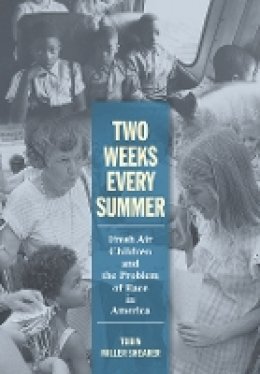
Two Weeks Every Summer: Fresh Air Children and the Problem of Race in America
Tobin Miller Shearer
Two Weeks Every Summer, which is based on extensive oral history interviews with former guests, hosts, and administrators in Fresh Air programs, opens a new chapter in the history of race in the United States by showing how the actions of hundreds of thousands of rural and suburban residents who hosted children from the city perpetuated racial inequity rather than overturned it. Since 1877 and to this day, Fresh Air programs from Maine to Montana have brought inner-city children to rural and suburban homes for two-week summer vacations. Tobin Miller Shearer brings to the forefront of his history of the Fresh Air program the voices of the children themselves through letters that they wrote, pictures that they took, and their testimonials. Shearer offers a careful social and cultural history of the Fresh Air programs, giving readers a good sense of the summer experiences for both hosts and the visiting children. By covering the racially transformative years between 1939 and 1979, Shearer shows how the rhetoric of innocence employed by Fresh Air boosters largely served the interests of religiously minded white hosts and did little to offer more than a vacation for African American and Latino urban youth. In what could have been a new arena for the civil rights movement, white adults often overpowered the courageous actions of children of color. By giving white suburbanites and rural residents a safe race relations project that did not require adjustments to their investment portfolios, real estate holdings, or political affiliations, the programs perpetuated an economic order that marginalized African Americans and Latinos by suggesting that solutions to poverty lay in one-on-one acts of charity.
Product Details
About Tobin Miller Shearer
Reviews for Two Weeks Every Summer: Fresh Air Children and the Problem of Race in America
N. Zmora
Choice
Tobin Miller Shearer investigates how Fresh Air programs’ overwhelmingly white leadership and supporters reckoned with race during the period of demographic transition between 1939 and 1979... Two Weeks Every Summer offers us a valuable story about the racial politics and consequences of childhood reform efforts and the role of children in civil rights activism. Shearer’s criticism of Fresh Air reform is convincing, and present day organizations should follow his suggestion to look honestly at their histories.
Marika Plater, Rutgers University
The Journal of the History of Childhood and Youth
A meticulously researched examination of the "Fresh Air movement" sponsored by newspapers and social service agencies from the 1870s into the present.... One of the strengths of Shearer's narrative is that he is able to shed light on unexamined assumptions about poverty, race, innocence, and the city and its peoples while also providing clear evidence that there were also people who, when faced with unexpected challenges to their tangled generosity, learned something new and constructive.... An impressive and important book.
American Historical Review
This book is a must read for those who may desire an understanding of the sojourn experiences of children who were selected to participate in the Fresh Air programs during a turbulent era in America's history. Through the author's telescopic lens of archival evidence and oral histories, readers are offered glimpse of those telling experiences, in particular, the last chapter that provided oral histories from two Fresh Air participants.
The Journal of African American History
